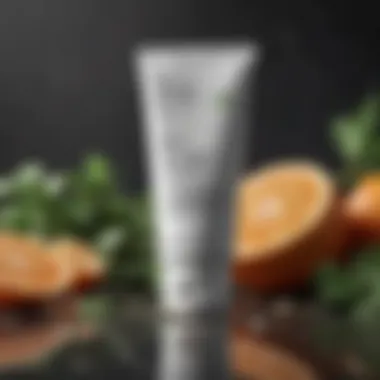Choosing the Best Acne Face Washes for Clear Skin


Intro
Acne remains a prevalent concern for many individuals, often leading to relentless searches for effective solutions. One key element in addressing this issue is the choice of face wash. The market is flooded with countless options, each promising clear and radiant skin. However, the effectiveness of an acne face wash relies heavily on understanding various factors, such as skin types, active ingredients, and potential side effects.
This article provides a detailed examination of what constitutes an effective acne face wash. We explore various formulations and active ingredients, offering insights to help guide your choices. Furthermore, we discuss how to complement these cleansers with appropriate skincare routines, thereby reinforcing their effectiveness.
At its core, this comprehensive guide is designed for individuals seeking to make informed decisions about acne treatments, steering clear of common pitfalls often encountered when selecting skincare products. By the end of this article, readers will have a broader understanding of their options and be better equipped to choose products that align with their unique skin needs.
Prologue to Acne Treatment
Acne remains one of the most common skin conditions worldwide. This problem affects diverse populations, with varying implications on psychological and physical health. Understanding acne is essential, as it forms the basis for effective treatment, including the choice of face washes.
Effective acne face washes play a critical role in managing this skin condition. They help remove excess oil, dirt, and dead skin cells, which can contribute to breakouts. By addressing these issues through cleansing, individuals can significantly reduce the frequency and severity of acne flare-ups. This article aims to equip readers with the knowledge to select the appropriate products based on their unique skin requirements.
Each choice in skincare products, especially face washes, has consequences. Incorrect selections may lead to irritation or exacerbation of acne. Thus, comprehending what ingredients and formulations are beneficial is paramount. Awareness about these elements paves the way toward clearer skin, improving not only appearance but also self-esteem.
Understanding Acne
Acne arises from blocked hair follicles, primarily due to sebum overproduction and accumulation of dead skin cells. Hormonal fluctuations, particularly during puberty, menstruation, and stress periods, further exacerbate these conditions. While it is often dismissed as a teenage issue, acne can persist into adulthood, affecting men and women alike.
From a medical standpoint, acne has various types. The most common are:
- Comedonal Acne: Characterized by closed (whiteheads) or open (blackheads) comedones.
- Inflammatory Acne: Includes papules, pustules, and cysts, often red and swollen.
Understanding the nature of one's acne is crucial for informed decisions regarding treatment. Each type may require different approaches, making this section vital for those seeking effective management.
The Role of Cleansing in Acne Management
Cleansing is not merely a cosmetic routine; it is foundational in acne treatment. The primary function of a face wash is to clear impurities from the skin surface. Inadequate cleansing can lead to further blockage of pores and worsen acne.
Effective cleansing involves a few core practices:
- Frequency: Regular cleansing, ideally twice daily, helps to maintain skin balance.
- Gentleness: Harsh scrubs may irritate the skin and provoke an inflammatory response. Instead, opt for gentle cleansers.
- Appropriate Formulation: An effective face wash should be tailored for acne-prone skin. This often means choosing a cleanser with active ingredients that combat bacteria and excessive oil.
The significance of cleansing cannot be understated. Proper cleaning habits lay the groundwork for successful acne treatment, ensuring that succeeding skincare products can perform effectively. Moreover, it also forms part of a holistic approach to skincare that considers the individual's entire routine.
Essential Ingredients in Acne Face Washes
Understanding the essential ingredients in acne face washes is critical for making informed choices. The effectiveness of a product often relies on the active components it contains. Each ingredient works differently, targeting various causes of acne, such as excess oil, clogged pores, and bacterial growth. Knowing how these elements function can help individuals select the right product based on their unique skin conditions and needs.
Benzoyl Peroxide
Benzoyl peroxide is a widely recognized ingredient in acne treatment. It has antibacterial properties that combat the bacteria responsible for acne. By introducing oxygen into the pores, it can help prevent the formation of new breakouts. This ingredient is effective for many people, but it can cause dryness. Users should consider pairing it with moisturizers to mitigate this effect.
When using benzoyl peroxide, it’s essential to start with lower concentrations. Gradually increasing usage can help the skin adjust, often leading to better outcomes without excessive irritation. In terms of safety, it is best to do a patch test before applying it widely on the face.
Salicylic Acid
Salicylic acid is another popular ingredient, classified as a beta hydroxy acid. Its primary function is to exfoliate the skin and unclog pores, preventing the buildup of dead skin cells that can contribute to acne.


Salicylic acid penetrates deep into the pores, making it effective for treating various types of acne, including blackheads and whiteheads. Users may appreciate its double-action; it not only clears existing blemishes but also minimizes the chances of future breakouts. However, salicylic acid may also lead to dryness or peeling, hence proper hydration is recommended after use.
Tea Tree Oil
Tea tree oil is a natural alternative that has gained popularity for its anti-inflammatory and antiseptic properties. This oil can help soothe inflamed skin, reducing redness and discomfort associated with acne.
Considered less harsh than synthetic ingredients, tea tree oil is suitable for those with sensitive skin types. However, users should apply it with caution, as it's potent and may need dilution to avoid irritation. Regular but moderate application can lead to noticeable improvements without the negatives often experienced with harsher treatments.
Alpha Hydroxy Acids
Alpha hydroxy acids, or AHAs, are commonly derived from natural sources such as fruit. They primarily function as exfoliants, removing dead skin cells from the skin's surface. This action not only helps with existing acne but also improves overall skin texture.
In addition to their exfoliating benefits, AHAs may also enhance skin hydration, leaving the skin feeling smoother and softer. For individuals struggling with acne scars or uneven skin tone, incorporating AHAs into a skincare routine can be a beneficial choice. However, as with all active ingredients, a gradual introduction is wise to gauge skin tolerance.
Choosing the Right Formula
Selecting the right formula for acne face washes is a critical step in achieving clear skin. Not every product works for every skin type, and understanding the differences between formulations can guide users towards a more effective skincare routine. Factors like skin type, texture, and personal preference all play vital roles in this choice.
Foam vs. Gel Cleansers
Foam cleansers are often praised for their refreshing and lightweight feel. They typically contain surfactants that create a rich lather, helping to remove excess oil and impurities. This makes them appealing for those with oily or acne-prone skin. The bubbles can effectively penetrate the skin's surface, making them feel clean after use. However, users with a tendency for dry skin might find this type stripping and harsh, leading to further skin irritation.
In contrast, gel cleansers tend to offer a gentler experience. They maintain moisture while still providing a thorough cleansing action. Their texture allows for a soothing cleanse that can still combat acne. Many gels contain beneficial ingredients tailored for sensitive skin, making them a versatile choice.
Ultimately, the decision between foam and gel cleansers should be based on your skin's specific needs and how it reacts to various formulations over time.
Cream Cleansers for Dry Skin
Cream cleansers have a thick, luxurious texture that hydrates while cleansing. They are ideal for drier skin types that suffer from tightness or flakiness. By incorporating oils and emollients, these cleansers prevent moisture loss during the cleansing process.
For people experiencing dryness due to acne medications, cream formulas can provide the necessary hydration without clogging pores. They allow for a gentle cleansing experience that still addresses acne. Users should search for cream products labeled as non-comedogenic to ensure their selection will not exacerbate acne concerns.
Sensitive Skin Considerations
When addressing acne in sensitive skin, the choice of cleanser requires additional scrutiny. Gentle ingredients are paramount. Some beneficial options include non-foaming cleansers or those enriched with soothing botanicals like chamomile or aloe vera.
Avoiding harsh exfoliants or abrasive materials is crucial, as they can provoke irritation. Always test a new product on a small skin area before broader application. The pH balance of the cleanser is also vital. Products with a pH close to that of natural skin (around 5.5) can help maintain the skin barrier, reducing the risk of discomfort and allergic reactions.
"Choosing a cleanser that resonates with your skin's needs is a foundational step in acne treatment."
Skin Types and Their Needs
Understanding the varying skin types is crucial when selecting an effective acne face wash. Each skin type has unique characteristics, which means that one formula cannot fit all. By identifying one's skin type—whether oily, dry, combination, or sensitive—individuals can better select products that address their specific needs. This section will explore the importance of recognizing these differences, the benefits of tailored skincare, and key considerations for each skin type.
Oily Skin
Oily skin is characterized by an overproduction of sebum, often leading to periodic breakouts and a shiny appearance. People with oily skin typically benefit from face washes that contain ingredients such as salicylic acid or benzoyl peroxide. These ingredients help to penetrate pores, reduce oiliness, and decrease acne. It is essential to use a cleanser that effectively removes excess oil without stripping the skin of necessary moisture.
Usually, foaming gel cleansers work well for oily skin as they can remove grime and excess oil effectively. However, individuals should stay alert to their skin's response; if skin feels too tight after cleansing, it could indicate over-cleansing or irritation.
Dry Skin


Those with dry skin often experience a lack of moisture, leading to flakiness and irritation. Using a harsh acne face wash can exacerbate these symptoms, making the choice of product even more critical. Cream-based cleansers that include moisturizing ingredients are recommended for this skin type. Ingredients like glycerin or hyaluronic acid are beneficial, as they hydrate the skin while providing adequate cleansing.
It is important to choose a product that is specifically designed for dry skin, avoiding any face wash with strong exfoliating agents that may aggravate the condition. Additionally, moisturizing after cleansing is vital to restore the skin barrier.
Combination Skin
Combination skin presents unique challenges as it can exhibit characteristics of both oily and dry skin. The T-zone often remains oily, while areas like the cheeks may be dry. Selecting an acne face wash for combination skin requires a careful balance. Products should ideally cleanse effectively without overly drying the skin.
Gel cleansers infused with mild active ingredients can often be suitable, as they maintain hydration while addressing occassional breakouts. It's worth noting that this skin type may benefit from using different products for different areas, applying a targeted approach for T-zone and drier areas.
Sensitive Skin Types
Sensitive skin can react adversely to many skincare ingredients. Therefore, choosing an acne face wash requires a careful examination of the product's formulation. Gentle cleansers that are free from alcohol, fragrances, and harsh chemicals are ideal.
It might benefit one to use products containing soothing ingredients like aloe vera or chamomile, which help alleviate irritation while providing cleansing. Patch testing a new product is advisable to gauge the skin's reaction. Using two-in-one products that combine cleansing with skin-soothing properties can significantly aid individuals with sensitive skin.
Each skin type has distinct needs and requires suitable products to maintain healthy skin, particularly when dealing with acne. Choosing wisely can lead to improved skin health and satisfaction.
Potential Side Effects of Acne Face Washes
The use of acne face washes can play a crucial role in managing breakouts and achieving clearer skin for many individuals. However, as with any skincare product, these cleansers are not without potential side effects. Understanding these effects helps consumers make informed choices, avoiding formulations that may exacerbate their skin concerns. The discussion on side effects is essential in ensuring that acne treatment is effective yet gentle on the skin, ultimately leading to better compliance and satisfaction with selected products.
Dryness and Irritation
Dryness and irritation are among the most common side effects experienced with acne face washes. Ingredients like benzoyl peroxide and salicylic acid, while effective against acne, can strip the skin of its natural oils. This can lead to a compromised moisture barrier, causing skin to become tight, flaky, and irritated. For those with sensitive skin or existing dryness, the impact can be even more pronounced.
To mitigate these effects, it is critical to choose a cleanser that aligns with your skin type. A balancing approach can be beneficial. For instance, consider incorporating a hydrating toner or a gentle moisturizer after washing your face. This can help replenish moisture without interfering with the acne-fighting properties of your cleanser. Moreover, using products labeled as “non-comedogenic” can be a safer bet for those prone to breakouts while addressing dryness.
Allergic Reactions
Allergic reactions can occur when using acne face washes, particularly in individuals with sensitive skin. Ingredients such as fragrances, dyes, or even some active components can trigger redness, itching, and hives. Such reactions can discourage continued use and provoke further skin problems.
It is advisable to conduct a patch test when trying a new product. This process involves applying a small amount of the product to a specific area of skin for a few days. By doing this, you can monitor for any adverse reactions before applying the product to your entire face. If an allergic reaction does occur, discontinue use immediately and consult a dermatologist if symptoms worsen.
Long-term Use Concerns
Long-term use of certain acne face washes presents concerns that should not be ignored. For instance, frequent application of strong active ingredients may lead to increased skin sensitivity, further irritation, or a condition known as "perioral dermatitis," which manifests as red bumps around the mouth.
Continuous use can also lead to resistance, where acne-causing bacteria adapt and become less susceptible to treatment. This may result in worsening breakouts, compelling users to switch products or adopt more aggressive treatments, potentially exacerbating the problem. To avoid these complications, it is prudent to cycle through products, incorporating gentler options on occasion, or consulting with a healthcare professional to reassess your skincare strategy.
Effective skincare is about balance. Consider what your skin needs as you navigate through acne treatment choices.
Complementing Face Wash with Effective Skincare
Effective acne management is not limited to the use of a face wash alone. It involves a broader approach that includes skincare practices that can enhance the benefits of cleansing. A properly curated skincare regime can mitigate potential side effects of face washes, provide hydration, and protect the skin from harmful elements. This section will cover critical elements of post-cleansing skincare routines, focusing on moisturizing, strategic exfoliation, and sunscreen application.
Moisturizing After Cleansing
After cleansing, it is vital to moisturize the skin, even if it is oily or acne-prone. Moisturizers help restore hydration lost during washing. Many acne face washes may contain drying agents like benzoyl peroxide or salicylic acid, which can lead to increased dryness if not balanced with a good moisturizer. Choosing a lightweight, non-comedogenic moisturizer helps avoid clogging pores. Ingredients like hyaluronic acid or glycerin can provide effective hydration without exacerbating acne.
"Moisturizing after cleansing is essential for maintaining a balanced skin barrier."


It may seem counterintuitive for someone with oily skin to apply moisturizer. However, regular use of a suitable product will prevent the skin from overcompensating by producing excess oil, which could lead to further breakouts.
Using Exfoliants Strategically
In addition to regular moisturizing, incorporating exfoliation into your skincare routine can be beneficial. Exfoliants help to remove dead skin cells that can clog pores. They enhance skin texture and promote cell turnover. However, using exfoliants needs to be done judiciously, especially with acne-prone skin.
There are two main types of exfoliants:
- Physical Exfoliants: These include scrubs and brushes. They can be effective but should be used with caution. Over-exfoliating with physical methods can irritate the skin and worsen acne.
- Chemical Exfoliants: Products containing alpha hydroxy acids (AHAs) or beta hydroxy acids (BHAs) can offer deeper exfoliation without manual scrubbing. Salicylic acid is especially useful for acne-prone skin.
Using exfoliants 1-2 times a week can help provide clearer skin but should be adjusted based on individual skin tolerance.
Sunscreen Application
Finally, applying sunscreen is a non-negotiable step in any skincare routine, especially for those using acne treatments that can increase sun sensitivity. A broad-spectrum sunscreen with an SPF of 30 or higher should be applied daily, even when it's cloudy or if you plan to stay indoors.
Sunscreens for acne-prone skin should be lightweight and labeled as non-comedogenic. Mineral-based sunscreens containing zinc oxide or titanium dioxide are often recommended as they do not clog pores while providing protection from harmful UV rays.
In summary, integrating these practices into your skincare routine after using an effective acne face wash not only optimizes the results but also promotes overall skin health. By moisturizing, carefully exfoliating, and consistently applying sunscreen, the skin can remain balanced, hydrated, and protected.
Popular Acne Face Wash Products Reviewed
Selecting an effective acne face wash is critical for managing acne effectively. The right product can not only help reduce breakouts but also improve overall skin health. Therefore, a review of popular products provides insights into specific formulations that deliver results. By highlighting these products, readers can make informed choices based on their needs and skin type.
When evaluating acne face washes, it is essential to consider several factors including ingredients, skin compatibility, and user feedback. Each product may cater to a unique skin type or concern, making it vital to understand how these different face washes work. A thorough examination of various options will help clarify which products have proven efficacy and which might not meet expectations.
Product A Overview
Product A is often noted for its inclusion of benzoyl peroxide as the active ingredient. This component is well-established in acne treatment, as it works by killing acne-causing bacteria and helping prevent clogged pores.
Users frequently mention its efficacy in controlling breakouts, especially for oily skin. However, potential users should be aware that benzoyl peroxide can cause dryness or irritation, making it important to follow up with a good moisturizer after using.
Often, informed consumers appreciate a product that provides consistent results without excessive side effects. Choosing wisely can enhance the acne management experience.
Product B Overview
Next, Product B features salicylic acid, a well-balanced alternative for treating acne. Salicylic acid penetrates deeper into the skin, effectively exfoliating and clearing debris from pores.
This product is particularly effective for those with combination skin types. Many users find that it helps reduce the appearance of blackheads and whiteheads in addition to active breakouts. As a side note, people with more sensitive skin may need to trial this product, as results can vary.
Product Overview
Finally, Product C incorporates tea tree oil as one of its primary ingredients. Tea tree oil possesses natural antibacterial properties that help combat acne without harsh chemicals. Users appreciate a gentle approach, especially individuals who may struggle with irritation from more potent treatments.
This product often comes recomended for those interested in an organic route to skin care. However, it is still advisable to perform a patch test first to avoid possible allergic reactions or sensitivities.
The End and Recommendations
The conclusion section serves as a pivotal part of this article, emphasizing the importance of making informed decisions when selecting an acne face wash. With a multitude of options available in the market, understanding the nuances of each product is crucial for achieving effective skin care. This article has examined the various ingredients that contribute to the efficacy of acne face washes, explained the significance of choosing a suitable formula, and addressed the unique needs of different skin types.
Key Takeaways
- Ingredient Awareness: Recognize the active components such as benzoyl peroxide, salicylic acid, and tea tree oil, which are often included in acne face washes. Each has specific benefits and can target different aspects of acne.
- Skin Type Considerations: Select a face wash based on your skin type. Oily skin may benefit from foaming cleansers while dry skin could require cream-based formulas to ensure proper hydration.
- Potential Side Effects: Be mindful of possible side effects such as dryness or irritation, especially when switching products. It may be prudent to conduct patch tests before fully integrating a new face wash into your routine.
- Complementary Skincare: A face wash should not be viewed in isolation. Complement it with suitable moisturizers, exfoliants, and sunscreen to achieve optimal skin health.
- Consultation with Professionals: When in doubt, it is wise to consult with a dermatologist. Professional advice can provide tailored recommendations that consider individual skin concerns.
Final Thoughts on Acne Face Washes
In summary, selecting the right acne face wash is more than simply choosing a product off the shelf. It requires an informed approach that incorporates knowledge of ingredients, an understanding of skin types, and awareness of potential side effects. The comprehensive nature of this article aims to equip readers with critical insights necessary for making educated choices. As consumers navigate the multitude of options available, emphasizing efficacy and safety should always guide their decisions. By understanding these factors, women of all ages can better manage their skin health and achieve clearer, healthier skin. Whether you are battling persistent breakouts or just seeking to refine your skincare routine, a strategic choice of face wash can significantly impact your journey toward achieving clear skin.



